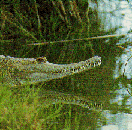


PAST CLIMATES
The earth was once warmer--and colder. Over millions of years, variations in Earth's orbit, volcanic activity, and other factors have caused our planet's atmosphere to warm and cool. Just a few degrees difference in the global average temperature can mean a major climate change. Scientists study fossils and other physical evidence to investigate past climates and anticipate future changes.

PHOTO:When our planet was only 9� F cooler, what is now New York City was buried under 1000 feet of ice. The ice sheet was higher than all but the tallest skyscrapers of today. But now due to global warming, it has melted down, causing an increase in the sea level.

PHOTO:Crocodiles thrive in warm, moist regions. At various times in the past, they lived in the Arctic and in what is now the Sahara Desert, showing how much climates have changed.
What is Climate Change ?
The temperature on Earth is regulated by a system known as the "greenhouse effect." Greenhouse gases
- primarily water vapour, carbon dioxide, methane and nitrous oxide - trap the heat of the sun, preventing radiation from dissipating into space. Without the effect of these naturally occurring gases, the average temperature on Earth would be -180C, instead of the current 150C. Life as we know it would be impossibleScientific evidence is gathering that human activities may be accelerating climate change. Levels of greenhouse gases such as carbon dioxide, methane, and nitrous oxide have increased significantly since the industrial age.
When we increase the amount of greenhouse gases in the atmosphere, it is projected that we may increase global average temperatures and produce climate change.
What Causes Climate Change?
The burning of fossil fuels is the major human induced source of greenhouse gas emissions.
- Each year, the world releases 5 to 5.5 billion tonnes of carbon dioxide by burning fossil fuels.
Another source of climate change is deforestation. Our forests and wetlands absorb and store greenhouse gases and naturally regulate the atmosphere. Each year the world releases 1 to 1.5 billion tonnes of carbon dioxide through deforestation. Why Should We Be Concerned ?
The concentration of greenhouse gases in our atmosphere is rising at an unprecedented rate. Current concentrations of carbon dioxide are 30% above pre-industrial levels; one-half of this growth has happened in the past 30 years.
Scientists predict that the average global temperature could rise by 1�C to 3.5�C over the next century.
If climate change continues unchecked :
- more health problems from heat stress, pollution and the spread of new infectious diseases;
changes in our ability to grow food and potentially costly changes to the methods we use to do it; longer and more frequent droughts in some areas, severe flooding in others; risks to fish, waterfowl and animal populations; and, more frequent forest fires and more severe weather events like thunderstorms and tornadoes.
